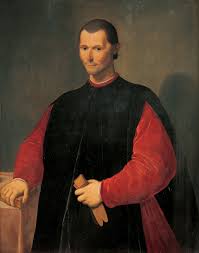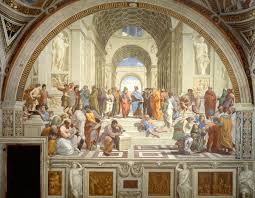Machiavelli
Machiavelli – The Truth and Importance of his Philosophy
Throughout history there have been many philosophers who have taken their time to shape and question the regular normality of the world around them, and the ways we as humans record and create history. Historiography, or the “history of history”, grows as a subject due to the great writers, philosophers, leaders, politicians, and thinkers throughout history. Niccolò Machiavelli, (1469-1527) is known to have an enormous influence on many writers following him, such as Descartes, Hobbes, Locke, Rousseau, Hume, Smith, Montesquieu, Hegel, and Marx. Much of his words echo in their writings but for even the few who disagree with his philosophy, they still acknowledge we must engage in his works to challenge and build from. Machiavelli, “was a mediating figure in Florentine historiography, a native Florentine and republican, he was also a secretary, commissioned historian, and man of letters.” (p. 95, Phillips), some of his greatest works titled The Prince (1532) and Discourses on Livy (1531) which were published after his death, Intel most of his deep thoughts and opinions on the way we must view history. In his writings “Torture, cruelty, calculated inflicted, assassinations, lying, the breaking of promises, utter ruthlessness, and moral hypocrisy are all legitimate instruments of statecraft for Machiavelli.” (p.93, Lemon) When reviewing his work from others there is not one person who fully accepted his philosophy as the one truth. Many philosophers question his intentions, the context of his teaching and works, his sincerity, and piety. But none say his impact on historiography and philosophy are unnecessary to telling the history of history.

Learning From History
Machiavelli’s “primary passion was for the maintained of an orderly governed society – and crucially, he thought that in the pursuit people can, and leaders should, learn from history.” (p. 94, Lemon) and in many contexts “Machiavelli states that his goal for his writing is to encourage people to apply historical context to the decision making of the present and the future. He was writing not because people did not know history, but because they simply neglected the tools that they already had obtained.” (p. 9, McRoberts) We as a people and population have a duty to create a better tomorrow by creating and structuring the means necessary to what history has given us. At the time there were two different types of historical writings and each had its own strengths and weaknesses. First we have the Humanistic historian who “concentrated on affairs of the state and composed linear narratives that were classified and augmented by reference to broad moral and political lessons.” (p. 86, Phillips) Second were the Vernacular chroniclers who “wrote to preserve the memory of notable events, both political and nonpolitical, especially those they had themselves witnessed.” (p. 86, Phillips) During the Renaissance both of these methods had to compete and coexist with each other, and while Machiavelli wrote more through the classicized tradition, he was not seen as a humanist. His works Intel important features of vernacular style, but also works through many humanistic reports to build arguments and create his philosophy on the importance of learning from history.

Machiavelli introduces this idea in his Discourses that were written to show his many thoughts on history and politics. He sees that history at that particular time in the 16th century, must me used and viewed in a different way. And to build his arguments he reviews the policies and procedures from ancient kingdoms and republics and the ways kings, legislators, soldiers, and basic citizens displayed wisdom and sacrificed themselves for the greatness of the country. Some examples would include maintaining the state, organizing an army, or to dispense justice. But none of this could be possible if antiquity (the ancient past before the Middle Ages) was out of the picture. During the 16th century Machiavelli is accusing his contemporaries of a political complacency and inefficacy born of historical ignorance. Yet the ignorance he means is not so much historical fact but ignorance of ‘the true sense’ or ‘the spirit’ of the history they read.” (p. 95, Lemon) This true sense being that we don’t use are imaginations when we look at historical figures to see their importance due to their actions in getting things done during their times. “Machiavelli thinks people are wrongly overawed by the historico-cultrual gap between their own times and antiquity, such that, out of their failure to understand ‘the new sense’ or ‘spirit’ of history, it appears to them impossible to learn from it.” (p. 96, Lemon) “In pointing to the historical and cultural gap between ‘Antiquity’ and the Middle Ages, and between both and the present, it was correct and beneficial. But left at that, it was not only incomplete; it was damaging – because if history is viewed solely as a succession of different ‘times’, it can lead to the idea that they are so different that history is no more than an entertaining read.” (p. 96, Lemon) Machiavelli wants his readers to understand that history is not just a meaningful story that is taking place, but a guideline for men to find lessons, and principles that can be applied to benefit mankind.
Introduction to The Prince
As stated before one of Machiavelli’s greatest works which was published after his death was The Prince. “The Prince should be read in a different manner; as a manual for daily life and the maximization of opportunity. The mere notion that Machiavelli, a former servant to the Republican government who praises his role of principality exemplifies his belief that adversity can be a blessing that has not been considered or planned.” (p. 7, McRoberts) In this book he starts by dividing humanity into three groups, the first being the vast majority of ordinary people who he refers to as “the vulgar”, second being “the few”, who are a much smaller group, and finally we have “the individuals”. The vulgar are the people who look and follow individuals by their appearances, they are “…the great majority of mankind that are satisfied with appearances, as though they were realities, and are often even more influenced by the things that seem than by those that are.” (p.97, Lemon) The few are not deceived by appearance and are more educated in knowing what is actually going on. Lemon confirms that, “He does not mean ‘education’ in the formal sense of schooling, but in the broader sense of the (moral, political, and religious) culture installed in people.” (p. 98, Lemon) this is the one defining aspect that seperates the few from the vulgar. Finally the individuals are the people who are actually in power or known as princes.

Human Nature
One main principle Machiavelli focuses on with these groups is human nature, or the many characteristics we as humans share which would include the way we feel, act, and think. People who are living in different areas of the world will always have opinions, laws, and actions that differ from other nations and progressively have changed from earlier to later times. Machiavelli focuses on human nature because its importance in government and state crafting. Many princes must act on their human nature when looking to direct a nation in the way they feel is necessary. It is important as a prince to know what the vulgar is interested and concerned about. Without understanding your population it could lead to the failure of the princes rein or a nations collapse. Princes may create policies that seem good at the time but will disregard the poison that lies underneath. A prince has the authority within his power to promote change. We see this in today’s politics during elections. Delegates promote their ideas of ‘change’ on what they hear from the people they plan to represent. Lemon build off this by saying, “this ‘love of change’ makes men fickle and easily influenced, and if they are to be managed, the fundamental principle that ‘men are promoted in their actions by two main motives… love and fear’, must be exploited, fear being the most reliable lever.” (p. 97, Lemon) His definition of fear is using any means necessary to making sure the secure the political well-being of the state above all else. “Overall, it is in this sense that sets the good princes apart from the rest of human kind. Machiavelli does not believe that all princes are great and divine, but in order to be a great prince one must take human nature into account in order to secure the state even if the procedures are too the extreme.
Fortune
Machiavelli’s final and most important philosophy is the concept of fortune. Defined by Lemon, “Fortune determines the times we live in, and can rapidly change them so that those who, by chance or intelligence have prospered by adapting to ‘the times’, can be ruined if then unable to change their ways to meet the new.” (p. 101, Lemon) Every leader is faced with a new challenge that is different and unique to their time period and situations. There are good times, bad times, prosperous times, threatening times, fast-moving times and slow-moving times. But in the end fortune will decide how one will either succeed or fail. In Chapter 25 of The Prince which is titled How far human affairs are governed by fortune, and how fortune can be opposed, Machiavelli details one of his most famous metaphors to describe the power of fortune. As stated below,
“I compare fortune to one of those violent rivers which, when they are enraged, flood the plains, tear down trees and buildings, wash soil from one place to deposit it in another. Everyone flees before them, everybody yields to their impetus, there is no possibility of resistance. Yet although such is their nature, it does not follow that when they are flowing quietly one cannot take percautions, constructing dykes and embankments so that when the river is in flood they would keep to one channel of their impetus be less wild and dangerous. So it is with fortune.” (p. 130, The Prince)

To many people they believe that fortune controls everything, and if that’s the case we as people would have no need to apply action to change the outcome. But what Machiavelli is stating with this analogy is that the other half is controlled by free will. The rivers may rise and destroy everything in their way but when their calm we can prevent and control the river by building dams and dikes. Every person has that ability to disrupt fortune and create a better future. McRoberts gives a great sum up of The Prince by saying, “While Machiavelli restricts himself to the praise of princes through his writing, he opens the door to making each person’s life meaningful through a healthy perspective of trials and the encouragement to be brave against anything that Fortune may bring. For not all men can prepare to conquer the world, but no one need be deprived of the ability to conquer opportunity.” (p. 11, McRoberts) Machiavelli’s works are a true testement of time. To an extent much of his workes helped shape and create certian political powers. Facism which was created in Italy developed using the concepts of fortune, and fear to creating the perfect state. Hitler in Germany followed in those footsteps and while the world fought two World Wars to promote and defend Democracy we still see traits in today’s politics. Machhiavelli not only shaped the way we think and write history, but his controbutions to a historigraphical knowledge promots constant questioning and presence as it defined history today and in the future.
Bibliography
- Niccolò Machiavelli, The Prince, 1961, Penguin Classics, Great Brittan.
- M.C. Lemon, Philosophy of History A Guide for Students, 2003, Routledge, New York
- Mark Phillis, Machiavelli, Gucciardini, and the Tradition of Vernacular Historiography in Florance, 1979, February, Oxford University Press, https://www.jstor.org/stable/1855661
- Laura McRoberts, The Personal and Political Implications of Machiavelli’s The Prince, 1996, Illinois Wesleyan University Press, Illinois, http://digitalcommons.iwa.edu/respublica/vol1/iss1/4